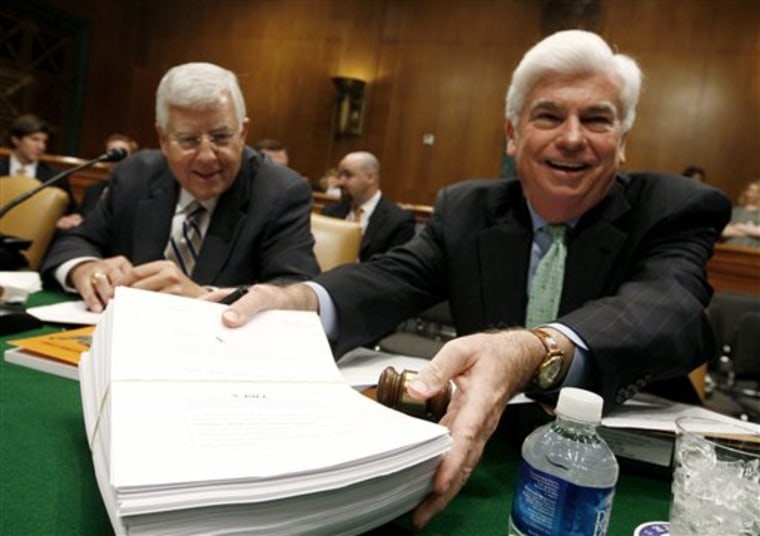Trying to regain momentum on a core issue of Barack Obama's presidency, House Democrats on Friday unveiled legislation they said would cover virtually all the nearly 50 million uninsured Americans.
Major provisions of the draft bill would impose new responsibilities on individuals and employers to get coverage, end insurance company practices that deny coverage to the sick and create a new government-sponsored plan to compete with private companies.
But it remained far from clear how the Democrats intend to pay for their plan, even as they vowed to take the legislation to the House floor by the end of July. Lawmakers got sticker shock this week after budget analysts estimated costs of $1 trillion-plus on just partial plans.
"If there is one thing that is off the table, it is saying 'no' to health care reform," said Rep. George Miller, D-Calif., chairman of the House Education and Labor Committee, one of three panels involved in writing the legislation.
The House leaders' news conference capped a week in which the health care overhaul effort seemed to stumble at the starting line.
Cost estimates forced lawmakers to revise their draft proposals. Democrats and Republicans dug in for partisan trench warfare. Tense divisions emerged among Democrats. And delays seemed inevitable.
The whole enterprise is "basically a gridlock," Sen. John McCain, R-Ariz., said Friday.
"This is not reform," added McCain, Obama's opponent in last year's presidential election. "This is why we should start over."
But Democrats had another description for the scene playing out across the Capitol: They called it the legislative process.
"This is just tedious hard work," said Sen. Kent Conrad, D-N.D. "It's just slogging through options."
White House press secretary Robert Gibbs dismissed suggestions that the drive for health care overhaul had faltered, arguing that he heard similar dire warnings about the stimulus measure, the budget and a supplemental war spending bill — measures that Congress eventually passed.
"We continue to put one foot in front of the other in the march toward health care reform," Gibbs told reporters.
He later added: "The president is not going to sign a health care bill that increases the size of the deficit."
Amid the heightened anxiety, the shape of the debate got a lot clearer.
Payment details left outOn one side is the House Democrats' sweeping health care bill. It would require all individuals to obtain health insurance and force employers to offer health care to their workers, with exemptions for small businesses. A new public health insurance plan, strongly opposed by Republicans, would compete with private companies within a new health care purchasing "exchange" where Americans could shop for coverage.
Government subsidies would help the poor buy care, and seniors in the Medicare program would pay less for their prescription drugs.
The House Democratic bill, released by the chairmen of the three committees with jurisdiction — Ways and Means; Energy and Commerce; and Education and Labor — left out key details of how it would be paid for.
Democrats are considering everything from taxing soda, to raising income taxes on upper income people earning more than $200,000, to a federal sales tax.
Obama, in a brief statement from the White House, said the proposal "would improve the affordability, availability and quality of health care and represents a major step toward our goal of fixing what is broken about health care while building on what works."
Even before the Democrats' news conference ended, Republican National Committee Chairman Michael Steele issued a statement warning that the Democrats' "health care taxfest will include higher taxes on Medicare, soft drinks, alcohol, employers — even a new national sales tax. All of this despite the president's promise to voters during the campaign that he would not raise taxes on 95 percent of taxpayers and would make health care cost less."
On the other side is the House Republican plan, which would focus on trying to help small businesses and self-employed individuals find private coverage.
Searching for the elusive middle ground are a small group of senators on the Senate Finance Committee, which had to scale back its initial plan when cost estimates topped $1.6 trillion.
The end result may be a bill that's more affordable but covers fewer of the nearly 50 million uninsured. It's too early to tell what will emerge.
Opposing measuresOn the other side of the Capitol, two Senate committees were going in separate directions on their health care bills. The Health, Education, Labor and Pensions Committee resumed work Friday on an expansive bill reflecting Democratic priorities, while members of the Finance Committee were laboring to produce legislation that could attract Republican support.
To that end, Finance Committee senators were looking at leaving a new public insurance plan out of their bill, instead creating nonprofit co-ops to offer insurance in competition with private companies, according to an outline obtained by the AP. The co-ops could accept federal loans for start-up operations but would have to repay the money.
Struggling to pare their bill from an earlier $1.6 trillion cost estimate to about $1 trillion over 10 years, Finance Committee members pared back proposed federal subsidies for the uninsured. The earlier draft would have helped people making up to four times the federal poverty level, or about $88,000 for a family of four. The new plan: limit insurance subsidies to those making up to $66,000.
